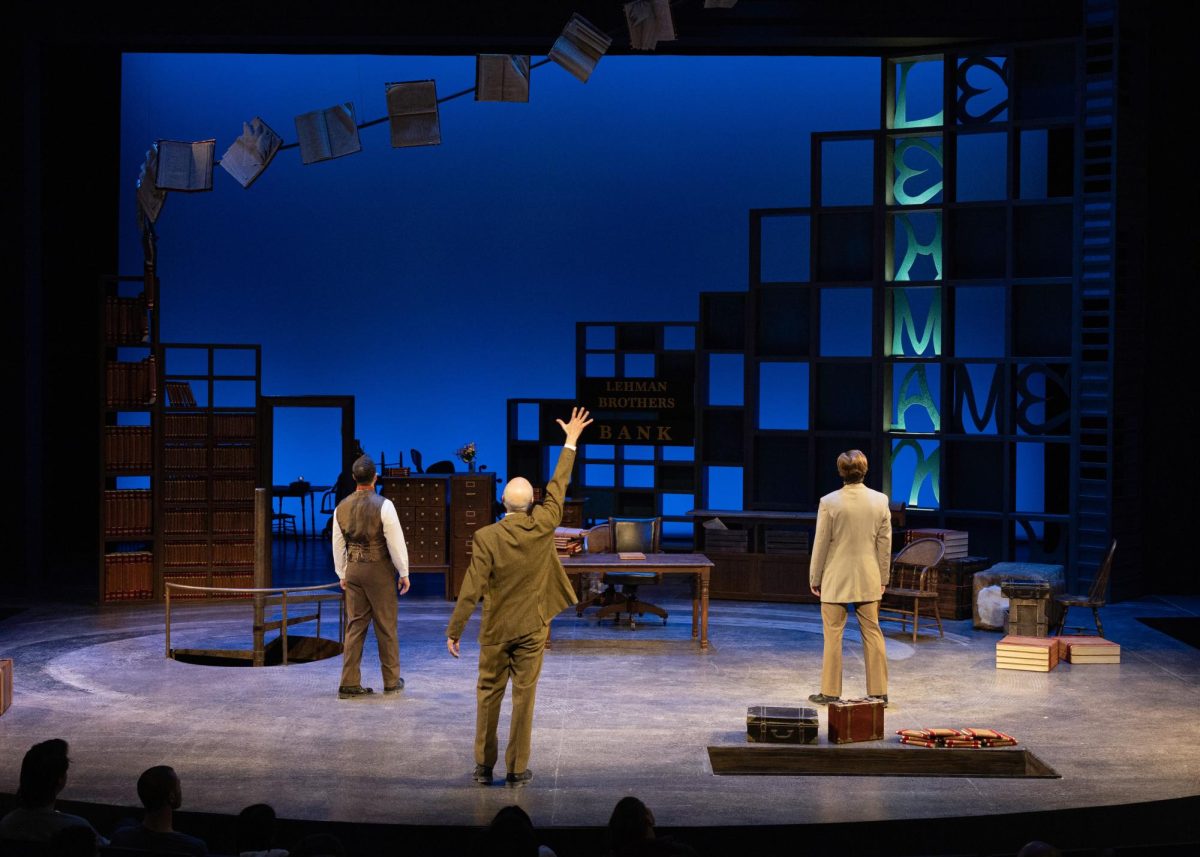The Einer Nielson Field House’s newly completed theater, the Meldrum Theater, opened its doors for the first time last Saturday for the Pioneer Theatre Company’s Utah debut of “The Lehman Trilogy.” The Tony-Award-Winning work by Stefano Massini and adapted by Ben Power follows the founding and fall of the Lehman Brothers corporation. The show runs through April 13.
Directed by Karen Azenberg and managed by dramaturg Alexandra Harbold, “The Lehman Trilogy” features a cast of just three actors: Jeff Talbott as Henry Lehman, William Connell as Emanuel Lehman and Seth Andrew Bridges as Meyer Lehman. But, throughout the play, dozens of characters are played between the three men.
The play begins in 1844 where we meet Henry, Emanuel and Mayer Lehman, the Lehman Brothers founders. The German immigrants begin their lives in the United States humbly by selling fabric out of a small shop in Montgomery, Alabama. Then, selling fabric turns to selling cotton, and the brothers soon assume the role of middlemen between cotton producers and cotton buyers.
The middlemen only continue to grow business from there, moving from Alabama to New York and from cotton to banking. Each new Lehman generation brings new ideas to the table. They take bigger business and make bigger investments until Lehman Brothers becomes a global giant in the world of financing. Suddenly, it all comes crashing down, and the company declares bankruptcy in 2008.
The Performance
The cast put on an incredible performance.
Connell was magnetic onstage and flawlessly brought life to each and every one of the characters he assumed. Subtle changes in facial expression, stature and voice not only helped to distinguish his characters from each other but also built personality and dimension into each persona. No personality felt underdeveloped, and each was easy to connect with. Connell’s emotional range should be given recognition, as well. He moves from being staunch and stubborn as a big businessman to a small and scared man in a nightmare, and then to a quippy and proud politician.
Andrew Bridges starts the show in the role of Mayer Lehman, a comical character and light-hearted character. It seems like this is the kind of role Andrew Bridges will be assuming throughout the play, the funny, simple people. He moves beyond this pigeonhole when in the third act, Andrew Bridges plays a young Lehman finally in charge of the company. Anger, ambition and pride all mix in this character. In his final scene as this Lehman, Andrew Bridges pours everything he has into an incredible scene of suspense and emotion that left goosebumps down my arm.
Talbott was a strong performer, though perhaps the weakest of the three. Some of his characters were notably more engaging than others. Talbott’s role as Henry Lehman, for example, was fantastic, and it was easy to believe he had become this hardened, stubborn but ambitious man trying to make his way in America. Though, later, as the owner of a diner or the love interest of a Lehman, it felt at times like he was simply reciting lines from a page.
Talbott was, though, notably proficient in accents. He was consistent in maintaining every one of his accents for every one of his roles. As he played multiple characters from the South, Talbott adeptly employed slight variations in tone, twang and emphasis that made it easy to understand who he was playing and when.
The engaging nature of the cast’s performances would have been nothing without the incredible choreography it was paired with. Suspense, confusion, sadness and even celebration were visualized in the way the characters occupied their space on stage. Everyone and everything on stage was constantly moving, not in a distracting way, but in a way that meant you never wanted to take your eye off it.
However, the show was not without its hiccups. The sound levels were inconsistent at times, and Connell’s microphone cut out twice.
The Play
“The Lehman Trilogy” is unique in its dialogue. Throughout the show characters switch between acting out a scene and describing it. It’s almost like watching a book, where you see on the stage in front of you the scenes you might imagine in your head while reading. The mix of narrative description and acting-out scenes themselves was well-balanced and allowed the audience to gain a thorough understanding of a character. Even when the characters themselves weren’t in many scenes.
The show moved well and at a pace that made it easy to stay engaged throughout its three-hour run time. However, as we moved forward in time the play would become somewhat harder to follow. Characters quickly enter and leave. It becomes difficult to ascertain both where we were in time and what state the company and the Lehman family were in.
In retrospect, the show becomes more confusing as the Lehman family loses their grip on their company. Perhaps this is intentional and is meant to mimic the confusion of the characters themselves.
Overall, the show was fantastic and well worth watching while it’s here. The set design is immaculate, the music well-fitting and the cast and crew’s talent radiates through every part of the play.



